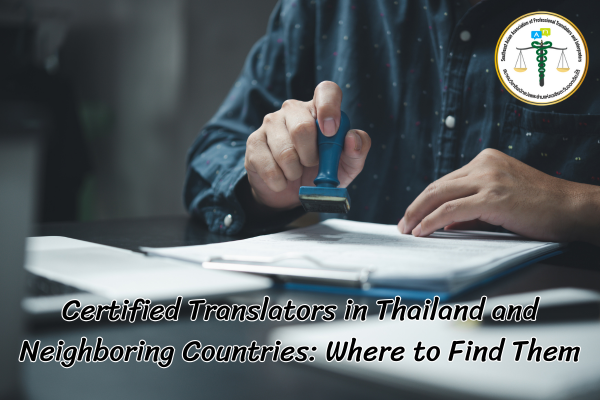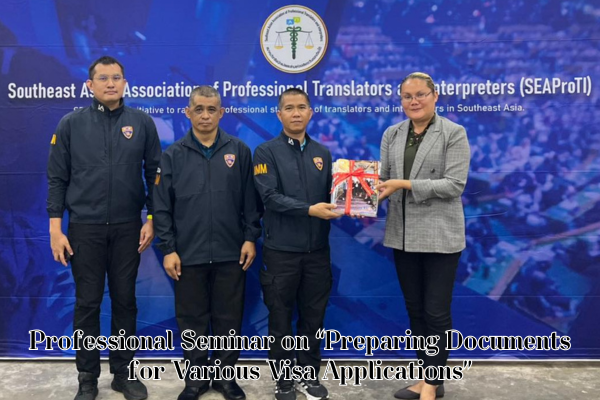The Language Register: A Linguistic Wardrobe for Every Occasion
29 December 2024, Bangkok – As we bid farewell to an extraordinary year of linguistic exploration, let’s delve into one of language’s most captivating aspects: language register. This fascinating feature of communication allows us to adapt our words, tone, and style to suit various situations, much like selecting the perfect outfit for different events.Language register is the linguistic equivalent of a versatile wardrobe. Just as you wouldn’t wear flip-flops to a formal dinner, you wouldn’t use casual slang in a job interview or pepper a business email with emojis (unless you’re feeling particularly daring). This concept of adjusting our language to fit the context is what makes communication so dynamic and effective.
The Spectrum of Language Register
Language registers fall along a continuum from informal to formal, each serving a specific purpose:Casual/Informal: This is the language of close friends and family, often characterized by relaxed grammar, slang, and colloquialisms. For example, “Yo, what’s up?” is a typical casual greeting.Neutral/Professional: This middle-ground register is used in everyday interactions, especially in work environments. It’s polite without being overly formal, as in, “Let’s discuss this project tomorrow.”Formal: Reserved for official or ceremonial situations, formal language emphasizes correctness and respect. An example might be, “Ladies and gentlemen, I appreciate your attention this afternoon.”
The Vibrant World of Slang
Slang is the life of the linguistic party—playful, creative, and ever-evolving. It serves as a powerful tool for connection, identity expression, and even subtle rebellion.Why slang captivates us:
- It’s trendy and fun, with phrases like “slay,” “no cap,” or “spill the tea” creating a shared cultural experience.
- It can transform serious moments into relatable experiences, such as saying “that’s a vibe” instead of “I agree.”
Contrary to popular belief, slang isn’t just the domain of teenagers. It’s a legitimate part of language evolution, often influencing mainstream vocabulary over time. Many words we consider standard today, like “cool” or “awesome,” began their lives as slang terms.
The Neutral Ground: Everyday Communication
The majority of our daily interactions occur in a middle-ground register. This neutral tone strikes a balance between politeness and approachability, clarity and casualness. It’s the go-to register for emails, workplace conversations, or interactions with acquaintances.While neutral doesn’t equate to boring, it does require a certain finesse. You can infuse personality into your communication while maintaining professionalism. For instance, instead of the stiff “I require your response promptly,” try a friendlier “Could you let me know by Friday? Thanks so much!”
The Elegance of Formality
Formal language is akin to donning your finest attire. It’s about conveying respect, especially in situations that call for professionalism, tradition, or gravitas. While it might feel stilted at times, formality ensures clarity and respect, particularly in diverse or high-stakes environments.Formal language shines in various contexts:
- Academic writing: “This study aims to analyze…”
- Ceremonies: “We gather here today…”
- Diplomatic settings: “It is with great honor that I…”
The Art of Code-Switching
One of the most remarkable aspects of language register is our innate ability to switch between them. This linguistic agility, known as code-switching, is like flipping a mental switch based on our environment, audience, and communicative intent.Examples of code-switching in action:
- Chatting with a close friend: “Bruh, you’ll never guess what happened!”
- Updating a manager: “I’d like to provide a quick update on today’s progress.”
- Speaking to a neighbor: “Hi, how are you? Beautiful weather we’re having!”
The more we practice navigating these shifts, the more adept we become at seamlessly adapting our language to various situations.
The Importance of Language Register
Understanding and mastering language register goes beyond merely using the right words. It’s about building relationships, avoiding misunderstandings, and connecting with people on their level.In personal life, the appropriate use of slang can foster closeness, while knowing when to adopt a more formal tone shows respect. In professional settings, employing neutral or formal registers helps project competence and consideration. In multicultural situations, matching the expected register demonstrates awareness of cultural norms and values.Mastering the art of language register makes us more adaptable, empathetic, and prepared for any conversational scenario. It allows us to navigate the complex social landscape with grace and effectiveness.
The Power of Register in Different Contexts
In Education: Teachers often adjust their register to make complex concepts more accessible to students. A university professor might use a more formal register in lectures but switch to a more casual tone during office hours to put students at ease.In Literature: Authors skillfully employ different registers to bring characters to life and set the tone of their narratives. The contrast between a character’s formal public persona and their casual private thoughts can add depth to the story.In Politics: Politicians are masters of register switching, using formal language in official speeches but adopting a more casual tone at local events to connect with voters.In customer service: Representatives often start with a neutral-formal register but may adjust to match the customer’s tone, helping to build rapport and resolve issues more effectively.
Conclusion: The Linguistic Chameleon in You
Language register reminds us of the incredible flexibility and power of human communication. From the casual banter of a group chat to the solemn tones of a graduation speech, every word finds its place in the grand spectrum of expression. Learning to navigate this spectrum not only helps us connect more effectively with others but also showcases the dynamic nature of language itself.As we conclude our year-long journey through The Language Classroom, we celebrate the rich tapestry of human expression. From decoding emojis to unraveling the neurological wonders behind language acquisition, it’s been an exhilarating exploration of the world of words.But this isn’t goodbye—it’s merely “until next time.” The Language Classroom will return in 2025, refreshed and ready with a new lineup of captivating language lessons, surprises, and stories. Until then, keep speaking, learning, and cherishing the languages that bridge our diverse world. Here’s to another year of linguistic adventures!
About SEAProTI’s certified translators, translation certification providers, and certified interpreters:
The Southeast Asian Association of Professional Translators and Interpreters (SEAProTI) has officially announced the criteria and qualifications for individuals to register as “Certified Translators,” “Translation Certification Providers,” and “Certified Interpreters” under the association’s regulations. These guidelines are detailed in Sections 9 and 10 of the Royal Thai Government Gazette, issued by the Secretariat of the Cabinet under the Office of the Prime Minister of the Kingdom of Thailand, dated July 25, 2024, Volume 141, Part 66 Ng, Page 100.
To read the full publication, visit: the Royal Thai Government Gazette
การปรับภาษา: ตู้เสื้อผ้าทางภาษาสำหรับทุกโอกาส
29 ธันวาคม 2567, กรุงเทพมหานคร – ในช่วงเวลาที่เรากล่าวลาปีอันน่าประทับใจที่เต็มไปด้วยการสำรวจโลกแห่งภาษา เรามาสำรวจอีกหนึ่งมิติที่น่าหลงใหลของภาษา นั่นคือ ระดับภาษา (Language Register) ความสามารถในการปรับคำ น้ำเสียง และสไตล์การสื่อสารของเราให้เหมาะสมกับสถานการณ์ต่าง ๆ ซึ่งเปรียบเสมือนการเลือกเสื้อผ้าที่เหมาะสมกับงานในแต่ละโอกาส
ระดับภาษา เปรียบได้กับตู้เสื้อผ้าสารพัดประโยชน์ของเรา เช่นเดียวกับที่เราไม่ใส่รองเท้าแตะไปร่วมงานเลี้ยงอาหารค่ำอย่างเป็นทางการ เราก็ไม่ใช้ศัพท์แสลงในระหว่างสัมภาษณ์งาน หรือเติมอิโมจิในอีเมลธุรกิจ (ยกเว้นถ้าคุณรู้สึกอยากลองอะไรใหม่ ๆ) การปรับภาษาให้เหมาะสมกับบริบทนี้เองที่ทำให้การสื่อสารมีชีวิตชีวาและมีประสิทธิภาพ
สเปกตรัมของระดับภาษา
ระดับภาษาสามารถแบ่งออกเป็นหลายระดับ ตั้งแต่ไม่เป็นทางการจนถึงทางการ โดยแต่ละระดับมีบทบาทเฉพาะของตนเอง:
- ไม่เป็นทางการ (Casual/Informal): ใช้ในการพูดคุยกับเพื่อนสนิทและครอบครัว มีลักษณะเด่นคือไวยากรณ์ที่ผ่อนคลาย คำแสลง และคำพูดที่เป็นกันเอง เช่น “ว่าไงแก”
- กึ่งทางการ/เป็นกลาง (Neutral/Professional): ใช้ในสถานการณ์ทั่วไป เช่น ในที่ทำงาน ให้ความสุภาพแต่ไม่เป็นทางการจนเกินไป เช่น “เรามาคุยเรื่องโปรเจกต์นี้กันพรุ่งนี้นะ”
- ทางการ (Formal): ใช้ในสถานการณ์ที่เป็นทางการหรือมีพิธีการ ซึ่งเน้นความถูกต้องและความเคารพ เช่น “ท่านสุภาพบุรุษและสุภาพสตรี ขอบคุณสำหรับความสนใจของท่านในวันนี้”
สีสันของศัพท์แสลง
ศัพท์แสลงเปรียบเสมือนตัวเอกของงานปาร์ตี้ในโลกของภาษา มีความสนุกสนาน สร้างสรรค์ และเปลี่ยนแปลงอยู่ตลอดเวลา ช่วยสร้างความสัมพันธ์และแสดงออกถึงตัวตน
เหตุผลที่ทำให้ศัพท์แสลงน่าดึงดูด:
- ทันสมัยและสนุก: เช่นคำว่า “ปัง,” “สุดปัง,” หรือ “ชิล ๆ”
- เชื่อมโยงประสบการณ์: เช่น การพูดว่า “เรื่องนี้ใช่เลย” แทนที่จะพูดว่า “ฉันเห็นด้วย”
นอกจากนี้ ศัพท์แสลงไม่ได้จำกัดอยู่แค่ในกลุ่มวัยรุ่น แต่ยังเป็นส่วนหนึ่งของวิวัฒนาการทางภาษา หลายคำในปัจจุบัน เช่น “แจ่ม” หรือ “เจ๋ง” ก็เคยเป็นศัพท์แสลงมาก่อน
พื้นที่กลาง: การสื่อสารในชีวิตประจำวัน
การสื่อสารในชีวิตประจำวันส่วนใหญ่เกิดขึ้นในระดับภาษาที่เป็นกลาง ซึ่งเป็นการผสมผสานระหว่างความสุภาพและความเป็นกันเอง เช่น ในอีเมลหรือการพูดคุยในที่ทำงาน
ระดับนี้ไม่จำเป็นต้องน่าเบื่อ คุณสามารถเพิ่มบุคลิกภาพในข้อความได้โดยยังคงความสุภาพ เช่น แทนที่จะพูดว่า “โปรดตอบกลับโดยด่วน” อาจใช้ว่า “คุณช่วยตอบกลับได้ภายในวันศุกร์ไหม? ขอบคุณมากค่ะ!”
ความสง่างามของภาษาแบบทางการ
ภาษาที่เป็นทางการเปรียบได้กับการสวมใส่เสื้อผ้าที่ดีที่สุดของคุณ มันเป็นเรื่องของการแสดงความเคารพ โดยเฉพาะในสถานการณ์ที่ต้องการความเป็นมืออาชีพหรือมีพิธีการ
ตัวอย่างของภาษาแบบทางการ:
- งานวิชาการ: “การศึกษานี้มีเป้าหมายเพื่อวิเคราะห์…”
- พิธีการ: “เรามารวมตัวกันในวันนี้เพื่อ…”
- การทูต: “เป็นเกียรติอย่างยิ่งที่เราได้…”
ศิลปะของการปรับเปลี่ยนระดับภาษา
หนึ่งในสิ่งที่น่าทึ่งที่สุดของระดับภาษา คือความสามารถของเราที่จะปรับเปลี่ยนตามสถานการณ์หรือผู้ฟัง สิ่งนี้เรียกว่า Code-Switching ซึ่งเปรียบเหมือนการสลับสวิตช์ในใจของเรา
ตัวอย่างของการปรับระดับภาษา:
- คุยกับเพื่อนสนิท: “แก เดี๋ยวเล่าอะไรให้ฟัง สนุกมาก!”
- รายงานหัวหน้า: “ผมอยากอัปเดตความคืบหน้าของวันนี้ครับ”
- ทักทายเพื่อนบ้าน: “สวัสดีค่ะ อากาศดีจังเลยวันนี้!
ความสำคัญของระดับภาษา
การเข้าใจและใช้ระดับภาษาอย่างเหมาะสมไม่ใช่แค่เรื่องของการเลือกคำพูดที่ถูกต้อง แต่มันยังช่วยสร้างความสัมพันธ์ ลดความเข้าใจผิด และเชื่อมโยงกับผู้คนในแบบที่เหมาะสม
- ในชีวิตส่วนตัว: การใช้คำแสลงที่เหมาะสมช่วยสร้างความสนิทสนม ขณะที่การพูดอย่างสุภาพในบางโอกาสแสดงถึงความเคารพ
- ในที่ทำงาน: การใช้ภาษาที่เป็นกลางหรือทางการช่วยสร้างภาพลักษณ์ที่น่าเชื่อถือและมีความเป็นมืออาชีพ
- ในสถานการณ์ระหว่างวัฒนธรรม: การปรับระดับภาษาตามค่านิยมทางวัฒนธรรมแสดงถึงความตระหนักรู้และการเคารพ
พลังของระดับภาษาในบริบทต่าง ๆ
- ในวงการศึกษา: ครูมักปรับระดับภาษาเพื่ออธิบายแนวคิดที่ซับซ้อนให้นักเรียนเข้าใจได้ง่าย
- ในวรรณกรรม: นักเขียนใช้ระดับภาษาเพื่อสะท้อนบุคลิกของตัวละครและสร้างบรรยากาศในเรื่องราว
- ในวงการการเมือง: นักการเมืองเปลี่ยนระดับภาษาเพื่อเชื่อมโยงกับกลุ่มเป้าหมายในบริบทต่าง ๆ
- ในบริการลูกค้า: ตัวแทนมักเริ่มต้นด้วยภาษาแบบเป็นกลาง-ทางการ แล้วปรับเปลี่ยนตามน้ำเสียงของลูกค้า
บทส่งท้าย: ความยืดหยุ่นทางภาษาภายในตัวคุณ
ระดับภาษาช่วยเตือนเราให้เห็นถึงความยืดหยุ่นและพลังของการสื่อสารมนุษย์ ตั้งแต่การพูดคุยเล่น ๆ ในแชทกลุ่ม ไปจนถึงคำพูดที่จริงจังในพิธีสำคัญ ทุกถ้อยคำล้วนมีที่ทางในสเปกตรัมของภาษา
ปีแห่งการสำรวจภาษาอันหลากหลายนี้กำลังจะจบลง แต่ไม่ได้หมายถึงการจากลา เพียงแค่ “แล้วพบกันใหม่” ในปี 2025 The Language Classroom จะกลับมาพร้อมกับบทเรียนใหม่ ๆ และเรื่องราวที่น่าตื่นเต้นอีกมากมาย
จนกว่าจะถึงตอนนั้น ขอให้ทุกคนสนุกกับการพูด การเรียนรู้ และรักษาความรักในภาษาไว้ให้แน่นแฟ้น!
เกี่ยวกับนักแปลรับรอง ผู้รับรองการแปล และล่ามรับรองของสมาคมวิชาชีพนักแปลและล่ามแห่งเอเชียตะวันออกเฉียงใต้
สมาคมวิชาชีพนักแปลและล่ามแห่งเอเชียตะวันออกเฉียงใต้ (SEAProTI) ได้ประกาศหลักเกณฑ์และคุณสมบัติผู้ที่ขึ้นทะเบียนเป็น “นักแปลรับรอง (Certified Translators) และผู้รับรองการแปล (Translation Certification Providers) และล่ามรับรอง (Certified Interpreters)” ของสมาคม หมวดที่ 9 และหมวดที่ 10 ในราชกิจจานุเบกษา ของสำนักเลขาธิการคณะรัฐมนตรี ในสำนักนายกรัฐมนตรี แห่งราชอาณาจักรไทย ลงวันที่ 25 ก.ค. 2567 เล่มที่ 141 ตอนที่ 66 ง หน้า 100 อ่านฉบับเต็มได้ที่: นักแปลรับรอง ผู้รับรองการแปล และล่ามรับรอง
























